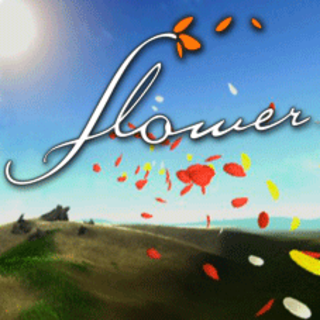Flower is an artistic achievement.
And amidst the heavy responsibility they have on their shoulders (as pioneers of the game industry, that is), their own, personal humility stands at the forefront -- and, in a sense, that attribute alone commands a respect for these individuals that only a very few others in the business can rival.
Flower is not a game for everyone; the mere thought of suggesting it to your homies back at the crackhouse might get yourself laughed at. And that's not necessarily a bad thing -- not all people who play video games are looking for unique, emotional experiences of any kind; some want a story, others want to collect stuff, and many just want to blow stuff up (I can honestly vouch for that). In the game of Flower, however, all of these gameplay characteristics (well, possibly excluding the collecting part...although it's probably not in the same sense you'd normally think of) are mostly abandoned to focus on what it primarily tries to achieve: an elegantly sentimental attack on our audiovisual perceptions, and for the most part, thatgamecompany most certainly does succeed.
The game is set up with a system of six, separate levels; you are given access to these levels through a prominent "hub" of sorts, which is represented as an inconspicuous apartment room with a lean, wooden desk by a gregarious window. Atop this desk are a collection of flower pots with different kinds of flowers planted in each; as you might have guessed, these pots represent the six different levels, and as you progress throughout the game, you accumulate access to each pot/level as a result of completing the previous one.You might also notice, as you finish each level, the distinct changes in your environment that is triggered each time you are brought back to the menu/hub; at first, your room is completely battered with window cracks, wall stains, and the like. A glum, bleak cloud looms over the city, as seen through the window, and a string of rusty laundry obstructs your view. The upper portion of a chair can be partially seen set by the desk in the lower right of the screen, but the raw lifelessnes reflected by this neighborhood alone is enough evidence to prove that it is probably rarely used. With such a relatably solemn premise, this single, almost seemingly irrelevant aspect of the game already provides a curiously gripping setting, and as you gradually fly your way through the levels themselves, you will also witness the significant, yet initially subtle, rectifications you passionately end up making to this originally neglected, desolate world, and as passive as they may be, the overall result is something you can genuinely feel that you yourself was responsible for, if only in part -- but whether or not you were just a surreal speculator or a time-manipulating entity, none of it entirely matters, because when it's all said and done, the overall experience of it all is certainly, (if anything), one of a kind.
Speaking of one of a kind, however, the levels themselves are a thoroughly enjoyable occasion, and the motion-powered controls work surprisingly well; I actually might even go so far as to say that they're one of the most well-implemented I've ever seen in a PS3 game as of yet, and definitely one of the most unique.
Nevertheless, in these levels, your main object of control is none other than the wind itself; by tilting your controller forward, backward, to the left, right, or anything else in between, you are able to control the direction in which the wind is blown, in which your primary goal is to pick up certain petals of significance that will be differentiated from the rest through an atypical radius of light. In doin' so, you will trigger certain events that will let you progress further through the level (e.g. opening a path of impenetrable rocks, spawning a whirling tornado of flower petals, etc.). Although it sounds like it may be a rather unremarkable game mechanic, thatgamecompany utilizes it in creative ways, and you may find yourselves being more entertained by this vital
collection of inanimate petals than you would have originally thought.
This is mainly due to their cohesive use of color and thoughtful employment of masterful artistry, along with the nearly flawlessly responsive gameplay that fails to underwhelm, even by the time you've reached the last stage; most importantly, however, is their beautifully crafted soundtrack, which constantly belittles your journey and immediately sets the tone of the game, from the first second you step into the first level to the most creative credits sequence I've seen since Portal.
To make a long story short, no game does what Flower does better than, well, Flower; in the same time, however, no game really does it worse. In a sense, this is one of the few games out there that can actually claim to provide an innovatively original experience and mean it, and that definitely isn't a bad thing. On the long run, it may not be a wholly memorable immersement of pure gaming glory, or a defining product of our current generation's industry, or even a raw representation of what games, as art, can live up to in the future -- but be as it may, whether the experience that thatgamecompany has indubitably crafted goes down in video game history as being good, bad, powerful, or even debilitating, it can probably be unanimously agreed upon that it is definitely, above all else, an unforgettable one.
And that is, by no means, anything for Chen, Santiago, or every other talented individual employed in this prodigial, growing light of the games industry, to be ashamed about.
7/10.

